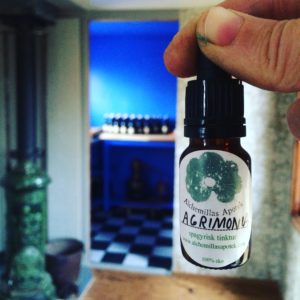
Agrimony
“Torturedly cheerful”
![]()
An astringent that tones the tissues but is used to relax the tissues. It is this paradox that is the magic that agrimony shares with many other medicinal plants.
States of stress such as spasms of the stomach, tension headaches, menstrual cramps where the person tries to hide it by pretending that everything is ok, “torturedly cheerful”
Pain in the spine, flu when you have pain in your joints.
Agrimony is also good for the kidneys and liver, poor digestion (indication: fat and undigested pieces of food in the poo), prevention of gall and kidney stones.
Incontinence, cystitis, urinary tract infection.
![]()
Agrimoy is superior for releasing tension and spasm, both on a physical and a psychological level. Agrimony is specifically indicated for those who try to hide their pain with a smile, behind a sophisticated and easy-going facade. Matthew Wood (The Earth Wise Herbal Vol 1) uses the phrase “torturedly cheerful” and it is very fitting.
![]()
Agrimony supports the connection between the brain and the other brain – the gut feeling, the enteric system. Agrimony is about strengthening the gut and is good for people who get pain in the belly out of concern and worry, around meals and eating or nervous, tense social situations. Pressing the emotions down into the gut.
80% of Serotonin is produced in the gut, far more than in the brain. One should never underestimate the gut feeling.
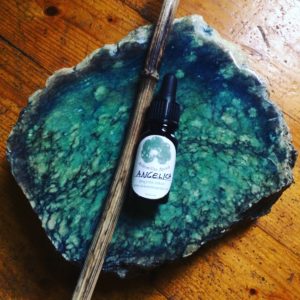
Angelica
As above – So below
![]()
Angelica is bitter, warming and aromatic.
It can be useful in treatment of swellings, inflammations and glandular indurations, particularly of the head and neck region. Good for circulation, for cold hands and feet. Used for fever.
It is good for anguish, spasms, nervous excitation and fatigue; calms excess in both the sympathetic and parasympathetic branches of the autonomic nervous system. It is good for PMS and excessive bleeding while menstruating.
Can be used for for arthritis and gout. Good for the liver, increases digestion and metabolism of oil and production of bile, hence increases digestion and nutrition. It relaxes the throat and makes it easier to take long deep breaths. It simultaneously opens the imagination and the mind when prana (life force through breath) can flow.
![]()
Angelica is an important Shamanic plant among the Saami people of the North.
In Native American herbalism it is referred to as a “Bear Medicine”. Just as the bear goes into hibernation through the winter, bear medicine usually relax the mind, open the imagination and bring people into dreamtime. Angelica certainly has this capacity.
Bears eats these roots upon awakening in spring to wake up, clear their throat and start rebuilding their mass.
![]()
I see Angelica as an embodiment of the Alchemical device “As above so below”.
The deep aromatic root and the umbrella-like flower full of starlike seeds are connected through a hollow stem, a channel connecting the heaven and the earth. This is one of the effects the Spagyric Tincture may have upon you – making you feel like this channel.
Angelica connects you with your guardian angel, or if you prefer to call it your higher self.
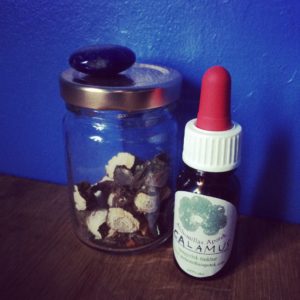
Calamus
The power to speak
![]()
Calamus root is aromatic and bitter. It is used for throat colds, sore throats, irritable coughs, laryngitis, chest colds, and head colds. It is considered an effective antihistamine; clearing stuffy sinuses and helping to dispel mucous. It is good when you've lost your voice and for singers or people who work with the voice.
It is also good for libido in both sexes. It also has a reputation in Ayurveda for benefitting conditions in the aging prostate. According to herbalist Henriette Kress “Calamus is astonishing for the pain from endometriosis. One of the few herbs we have for that; cherish it…”
![]()
Calamus also excels as a relaxant, despite its stimulating properties. “Stimulant” and “relaxant” shouldn't be seen a contradictory (uses occupying opposite ends of a polarity): stimulating herbs increase the expression of the vital force, while relaxants ease the resistance to that expression. They work together in a complimentary fashion to achieve the same end: better flow of energy and vitality.
Calamus can be incredibly effective in treating anxiety and is especially helpful in finding one’s voice and expression.
![]()
Calamus promotes circulation to the brain, sharpens memory, enhances awareness, and increases communication. The yogic name, Vacha, means “speech” and refers to its action on the fifth chakra and its propensity to help you speak from your highest consciousness.
Clarity, centering, perspective. Expressing one's truth. This is what the teachings of Calamus is about.
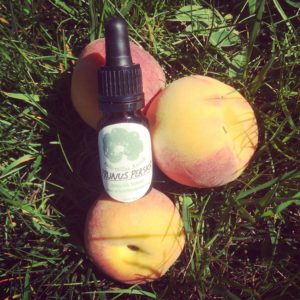
Peachleaf
“There are a whole lot of things in this world of ours you haven't started wondering about yet. ”
– Roald Dahl, James and the Giant Peach
![]()
The action of peachleaf moisturizing and cooling, helps when there is inflammation, inner heat and an overactive autoimmunesystem. Good in urineinfection when there is a burning sensation, morningsickness, dry caugh and allergy.
Peachleaf is suitable for those who easily get burned by the sun, have delicate skin and easily become red or get rashes.
![]()
Peachleaf is good for the restless, insomnia, worry and nervousness and is suitable for overactive children. Good for highly sensitive people.
![]()
In China it is believed that the peachtree possesses abundant vitality, more than any other tree and the peach is a symbol for longviety.
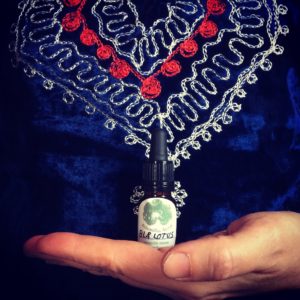
Sacred Blue Water Lily
“The sky was a midnight-blue, like warm, deep, blue water, and the moon seemed to lie on it like a water-lily, floating forward with an invisible current.” – Willa Cather
![]()
The Sacred Blue Egyptian Water Lily is deeply relaxing for the body and mind, it is hypnotic and sedative. It is also a cardio-tonic – strengthening the heart. It is also an aphrodisiac.
![]()
An aid for yogis as it is a plant for meditation. It is also a helpful herb for dreamwork. The blue-violet color of this flower is a signature of the affinities with the third eye and the crown chakra.
![]()
From the murky dark mud it rises up bestowing magnificent blossoms. It shows us our experience in human evolution, as it blooms – so can we. It is a metaphor for our reunion with oneness. I connect this flower to the divine feminine creative power, Shakti.
Shakti is both responsible for creation and the agent of all change. Shakti is cosmic existence as well as liberation, its most significant form being the Kundalini Shakti, a mysterious psychospiritual force.
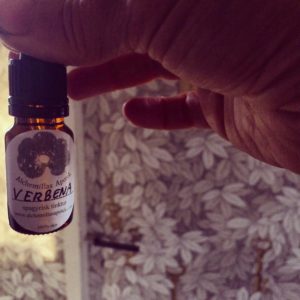
Vervain
Sacred herb of the druids.
![]()
Bitter tonic – good for digestion, moving stuck liver energy, nervine – good for burnt-out nervous system, relaxant – especially for tension in the neck, shoulder, head region, very good for painful menses and PMS, also for hot flashes.
![]()
Vervain helps the entrepreneur to unwind and stop working at home. It is indicated for list makers, for people with mental excess as it moves the energy downwards and works as a remedy of embodiment. Vervain people tend to neglect themselves, they forget to eat, drink water, clean the house, exercise etc.
Instead they tunnel vision on their goal and loose sight of other important facets of their life which can fall wayside.
![]()
Indicated for driven visionaries that can burn out from over exhaustion yet be constantly striving. Vervain helps the soul to center and ground its tremendous enthusiasm. The body becomes a natural regulator and harmoniser for the abundant spiritual forces that pour out of such a person, a soul that is able to inspire, lead and heal others.
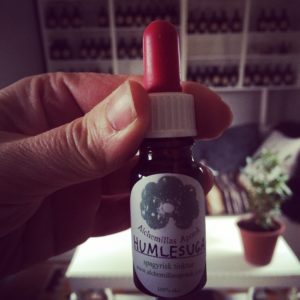
Wood Betony
Sell your coat and buy Betony!
Old italian proverb
![]()
Wood Betony is a herb for the head. Tension, new and older injuries to the head, headache and to strengthen the connection between gut and brain. It is a relaxant for the muscles, mucous membranes and of the nerves. It is good for ulcers and other digestive complaints.
![]()
it is a nervine, good for spaced-out people with a solar plexus deficiency. It helps the gut coordinating the digestive process and is grounding.
![]()
Wood Betony is said to protect from evil projections, jealousy and envy. Perhaps by strengthening the solar plexus, the will and survival instincts get stronger so they have no effect.
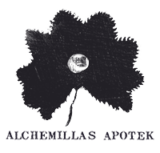
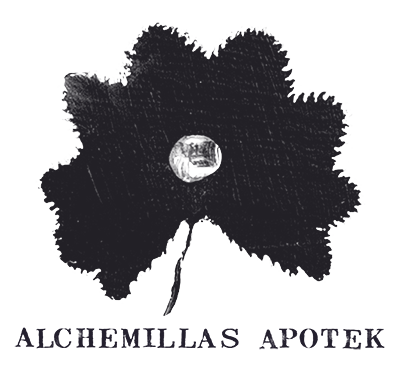

 English
English Svenska
Svenska